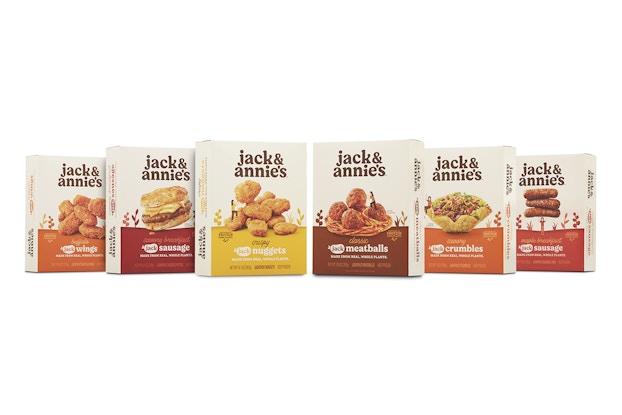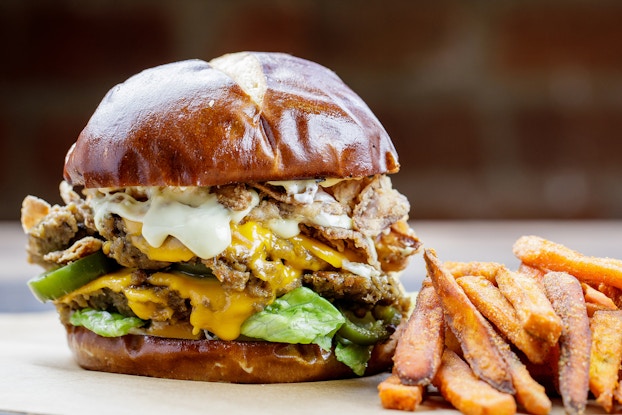
Why it matters:
- The number of consumers interested in plant-based diets is increasing, according to Murphy Research, which notes that 11% of ‘nutrition-engaged’ consumers are either vegan or vegetarian.
- Consumers want the benefits of incorporating more fruits and vegetables into their diets, but they also want their food to taste great.
- Veganism is too restrictive for many consumers, leading companies to focus on those people who want more dietary options and flexibility — hence the term “flexitarian.”
A growing number of companies are leveraging an ongoing shift toward plant-based eating, including meal-delivery specialist Mosaic Foods, food brand jack & annie’s, and restaurant operator Native Foods.
While the percentage of consumers who identify as vegan or vegetarian is small, more consumers, who may be what some describe as “vegan-curious” or “flexitarian” (people who shun meat products for certain meals or on certain days of the week, for example), are gravitating to plant-centric diets either for health reasons or to minimize their impact on the environment.

Interested in a small business membership?
Find out how the U.S. Chamber of Commerce can help your company grow and thrive in today's rapidly-evolving business environment. Connect with our team to learn how a small business membership can benefit your bottom line and help you achieve your goals.
Young consumers in particular are interested in eating more plant-based foods, according to a data from Murphy Research. The firm found that 11% of “nutrition-engaged” Americans — basically those who take some degree of interest in their nutritional intake — describe themselves as vegan or vegetarian.
“This number has grown significantly every year since 2019 as more consumers become
nutrition-engaged and adopt a formal food plan,” the company said in a recent report.
While millennials are the most likely age group to follow a vegan or vegetarian diet, 26% of nutrition-engaged Gen Z consumers said they are following a diet that includes reduced meat consumption. Among Gen Zers who are both nutrition-engaged and practice some “mindfulness” activities, that ratio jumps to 38% who are following a reduced-meat diet, according to a separate Murphy Research report.
The top five diet plans followed by nutrition-engaged Gen Zers, according to that report, are vegetarian (11% of these consumers), keto (10%), WW [formerly known as Weight Watchers] (8%), vegan (8%), and flexitarian (6%).
“Gen Z are attracted to formal food plans, especially those that focus on reducing meat/dairy, but with so many plans in action, they’re likely using them as guidelines more than strict rules,” the report concluded.
[Read: Tech Powers ‘Food as Medicine’ Trend Amid Consumer Quest for Holistic Nutrition]
The top five diet plans followed by nutrition-engaged Gen Zers, according to that report, are vegetarian (11% of these consumers), keto (10%), WW [formerly known as Weight Watchers] (8%), vegan (8%), and flexitarian (6%).
Mosaic Foods seeks to put ‘plants on every plate’
Mosaic Foods, which offers a subscription service delivering frozen vegan and vegetarian meals to consumers, seeks to appeal to those who are interested in eating great-tasting plant-based foods and enjoy the convenience of meal delivery.
Sam McIntire, Co-Founder and Chief Revenue Officer at Mosaic Foods, said he became interested in eating a more plant-based diet for health reasons, and now considers himself a flexitarian. He avoids meat at breakfast and lunch, he said, but allows himself to include meat at dinner.
His business partner at Mosaic Foods, Matthew Davis, CEO and Co-Founder, and a veteran of meal-subscription service Blue Apron, convinced him that plant-based food could be flavorful if prepared correctly.
“That was the genesis of the company,” said McIntire. “The whole thought was: How do we show everyone how to incorporate more plants into [their diets], and that it can be really delicious as well?”
Strict veganism, he said, is not appealing to many consumers because it is a highly exclusive diet, requiring the avoidance of foods such as processed sugars, which are often filtered using animal bone char and honey, which is considered an animal byproduct.
“We are taking sort of the opposite tack, and trying to be more inclusive,” said McIntire.
He described the company’s mission as “plants on every plate,” or simply encouraging consumers to eat more fruits and veggies.
About 70% of Mosaic’s products are vegan, he said, and the rest are vegetarian, which includes cheese — a key ingredient for many plant-based consumers — and other animal-derived products, such as eggs.
Rather than seeking to appeal to specific demographic groups, McIntire said the company is more focused on the psychographics of its potential customers — people who are interested in managing their health through diet or are concerned about reducing their own carbon footprint.
“Our customer is ‘vegan-curious’ or ‘plant-based curious’ — but they are worried that eating more plants is going to lead to less satisfaction with their meals,” McIntire said. “They think that meat is flavor, and they want to enjoy their meals, but they recognize all the [potentially] negative consequences of eating meat.”
Cooking satisfying meals that are vegan or vegetarian at home can, however, be challenging, he said, which is where Mosaic Foods sees an opportunity to provide its service.
In the last few years, the company has expanded from its Brooklyn base to much of the East and West Coasts, and recently opened its first brick-and-mortar pop-up location, near where the company was founded in Brooklyn. The pop-up is designed to test consumers’ potential appetite for the subscription brand in retail stores. Plans call for Mosaic’s further expansion into additional areas of the country not yet served, McIntire said.

jack & annie’s: Jackfruit-based meat alternatives offer ‘a real solution for omnivores and vegans alike’
Annie Ryu, CEO of jack & annie’s, which makes jackfruit-based products that are positioned as meat alternatives, said her company’s core target customers “are interested in eating less meat without sacrificing on taste.”
“These consumers may regularly enjoy meat, but want to reduce their meat consumption for health, environmental or animal welfare reasons,” she said.
The company’s products include a variety of meatless sausages, as well as meatless meatballs and meatless “analogs” (alternatives) of chicken nuggets and wings.
Ryu said she sees consumers’ interest in their own health as the main driver of transitioning toward a plant-based diet. The fact that jackfruit, which is high in fiber and has other health benefits, is the primary ingredient in all of jack & annie’s products helps attract these consumers, she said.
“I’ve also noticed that many consumers are not ready to take on a 100% plant-based lifestyle yet, and are turning to flexitarian diets instead to retain that extra balance,” Ryu said.
Ryu said jack & annie’s has plans to expand both in grocery stores and restaurants in 2022 and 2023.

Restaurant chain Native Foods targets non-vegan consumers via ‘great tasting’ meals that mimic meat-based menu items
Carin Stutz, CEO of Native Foods, which describes itself as 100% plant-based, said the restaurant chain seeks to reach consumers interested in plant-based foods without sacrificing flavor.
“Our guests are quite diverse in nature, young and old,” she said. “We cater to vegans, vegetarians, and flexitarians — people who are interested in plant-based, great-tasting food, and less dependent on meat being the center of their meal.”
Menu items range from plant-based burgers to a variety of bowls and sandwiches, barbecue plant-based “pork” tacos, and several plant-based “chicken” sandwiches.
Customers who are new to the chain are often interested in plant-based options that mimic meat-based restaurant items they may be more familiar with, Stutz said. The chain is known for its innovative, chef-crafted, vegan menu items that seek to drive ongoing consumer interest and excitement.
Native Foods focuses much of its communication efforts on reaching the non-vegan market with messages about the benefits of plant-based diets, said Stutz.
CO— aims to bring you inspiration from leading respected experts. However, before making any business decision, you should consult a professional who can advise you based on your individual situation.
Follow us on Instagram for more expert tips & business owners’ stories.
CO—is committed to helping you start, run and grow your small business. Learn more about the benefits of small business membership in the U.S. Chamber of Commerce, here.




